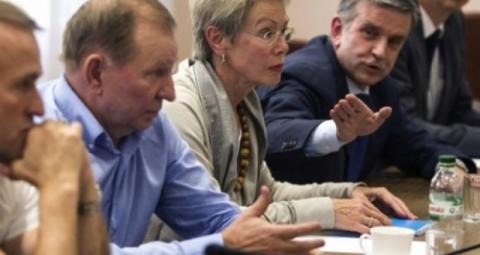
Ukrainian Says No Elections Without Full Security in Donetsk-Luhansk
Publication: Eurasia Daily Monitor Volume: 13 Issue: 38
By:

Negotiations in the Minsk Contact Group on political issues are so configured as to push Ukraine into recognizing the Moscow-controlled Donetsk and Luhansk “people’s republics” (DPR, LPR), first de facto and then de jure, through local elections and a “special status.” For its part, Ukraine shows increasing tenacity in resisting that push.
The political group’s February 24 meeting in Minsk illustrated those opposite efforts. The military and security situation on the ground is inseparable from the political issues, although that situation is being discussed in a separate Minsk group. Russian and “DPR-LPR” forces harass Ukraine through attrition warfare, threaten with escalation, and make the holding of local elections unthinkable under these circumstances (quite apart from the lack of political prerequisites to holding elections there).
That situation casts a dark shadow over the Minsk Group—comprised of Ukraine, Russia, the Organization for Security and Cooperation in Europe (OSCE), and the DPR and LPR. The triple-headed Russian side actually needs to foment military threats and insecurity, so as to pressure Ukraine into a “political solution” on Russian terms. For its part, Ukraine is turning the tables in the negotiations, arguing that the military and security situation must be resolved first, in order for a political solution to become feasible or legitimate. Thus, the situation that Russia and its proxies have created on the ground provides Kyiv with impregnable arguments against elections being held and the DPR-LPR authorities being recognized under these circumstances.
This has become the basis of Ukrainian diplomacy’s holding action in the Minsk Group and the “Normandy” group’s negotiations, resisting quick-fix political “solutions” under the gun. Western diplomacy, on the whole, responds to Kyiv’s holding action with ambivalence and varying degrees of impatience (see below).
In the Minsk Group’s February 24 meeting, the Ukrainian side listed its objections to holding local elections in the “DPR-LPR” in the existing military and security situation. Kyiv’s motto is, no elections without full security. Prerequisites would have to include: a complete ceasefire; the removal of “foreign” armed forces and “mercenary” troops (Minsk armistice euphemisms for the combined Russian and secessionist forces) from Ukraine’s territory; unrestricted access by the OSCE’s Special Monitoring Mission (SMM) to verify the removal of those forces from DPR-LPR-controlled territory; and the restoration of Ukraine’s control on its side of the Ukraine-Russia border (or, alternatively, international control on the Ukrainian side of the border) in that territory (UNIAN, February 24, 25).
For its part, the aggregate Russian side (Russia, DPR, LPR) wants to rush an agreement on the modalities of holding local elections in the “people’s republics” and their subsequent legalization by Kyiv. The Ukrainian side does accept discussion of those political issues; indeed, it comes up with detailed proposals about hypothetical local elections and their modalities in that territory. Without blocking such discussions outright, Kyiv maintains that any agreement on political issues would be premature until full security will have been established. The Russian side wants the Minsk armistice’s political clauses to be implemented first, and the military and security clauses to be discussed later. Ukraine insists on the opposite sequence. Hence, according to Ukrainian negotiator Roman Bessmertnyy, discussions in Minsk on each individual point ended with the OSCE mediator noting the “fundamental [printsipialnye] differences between the sides” (Ukraiynska Pravda, January 24).
“The sides” in that context means Kyiv versus Donetsk-Luhansk, in the classical paradigm imposed by Russia, aided and abetted by an OSCE itself hostage to Russia’s veto inside the organization. The Minsk Group brings a minor variation to that paradigm. Here, Russia does not officially hold a mediator’s status, but rather an ambiguous status as some kind of an observer. It disclaims any responsibility as a party to the conflict, but at the same time it firmly supports the DPR-LPR’s positions across the board, undoubtedly inspiring and pre-coordinating those positions. The OSCE’s role is that of mediator, with the net result that Ukraine is basically isolated in the Minsk Group.
The OSCE’s representative (currently Ambassador Martin Sajdik from Austria) has the status of Special Representative of the OSCE’s Chairmanship. This did not much matter in 2015, when Serbia held that chairmanship. But it does matter in 2016, when Germany’s Foreign Affairs Minister Frank-Walter Steinmeier is the OSCE’s Chairman-in-Office. He seems willing to advance a “political solution” that would involve sub-standard elections in Donetsk-Luhansk, their validation by the OSCE, corresponding changes to Ukraine’s constitution, and easing the economic sanctions on Russia. Working to rush those elections is Ambassador Pierre Morel of France, also with the status of the OSCE Chairmanship’s representative in the Minsk Group on political issues. The “Morel plan” involves amending Ukraine’s electoral legislation by agreement with Donetsk-Luhansk (in practice, with Moscow) to enable the holding of local elections with a semblance of Ukrainian consent.
However, establishing a security environment appropriate to any elections (irrespective of modalities) remains inconceivable as long as Russia refuses to accept responsibility as a party to the conflict and cooperates in establishing the necessary security prerequisites.




